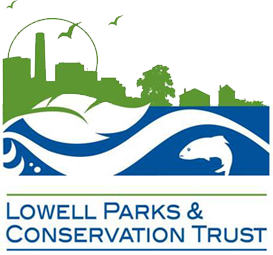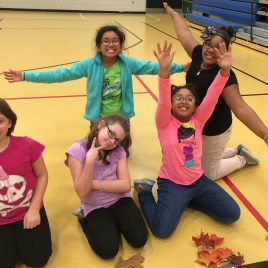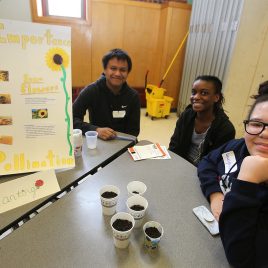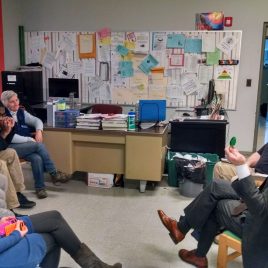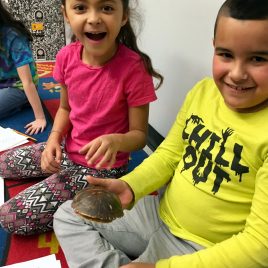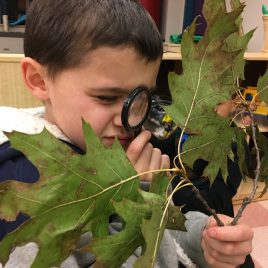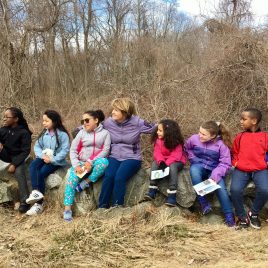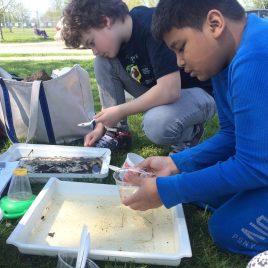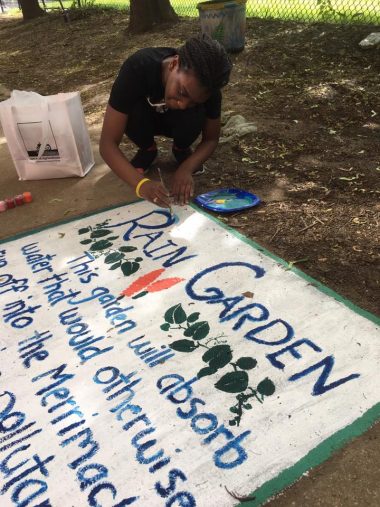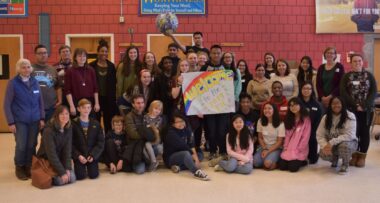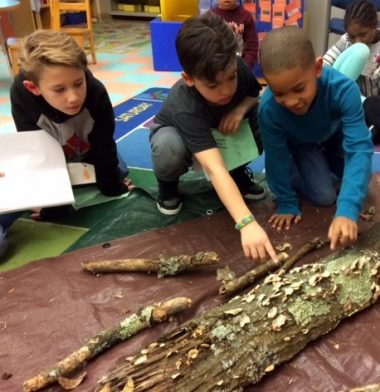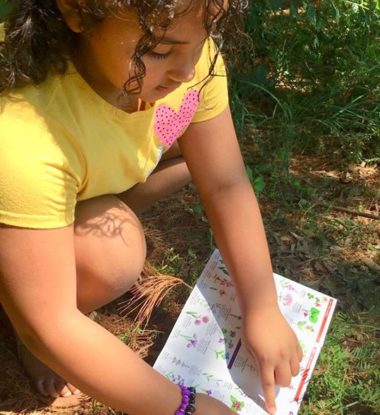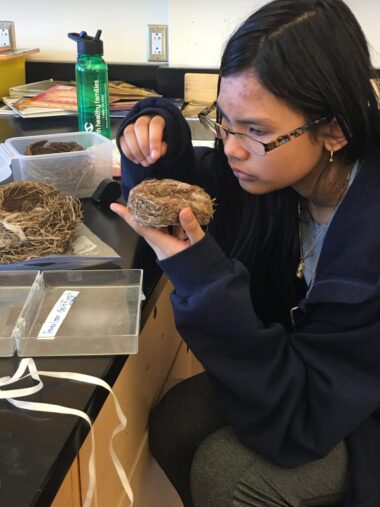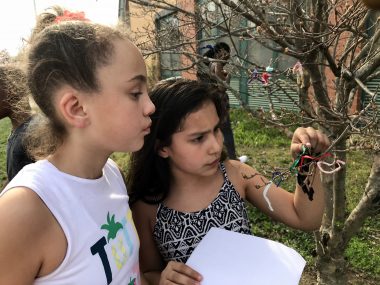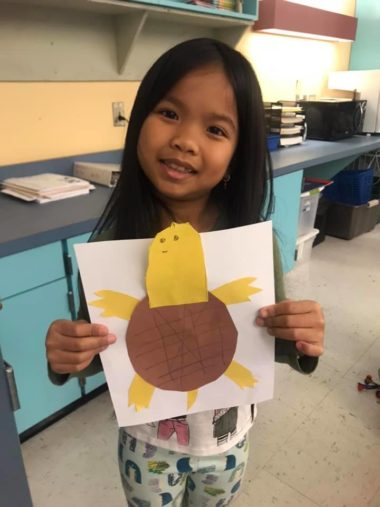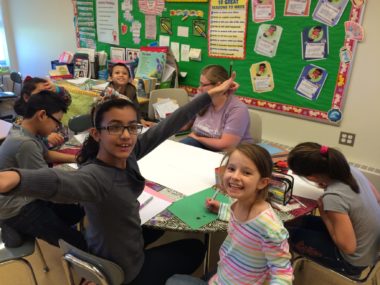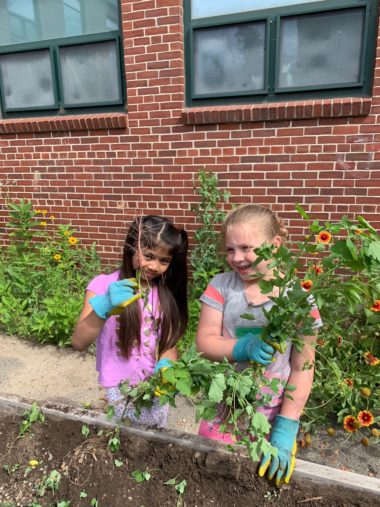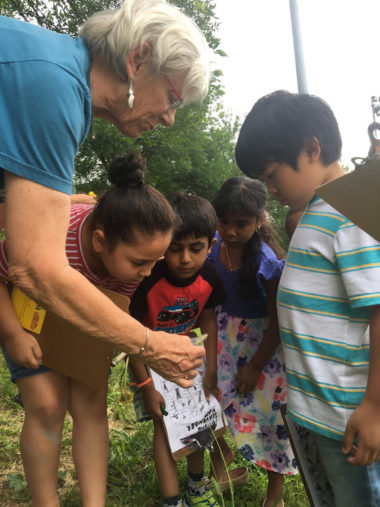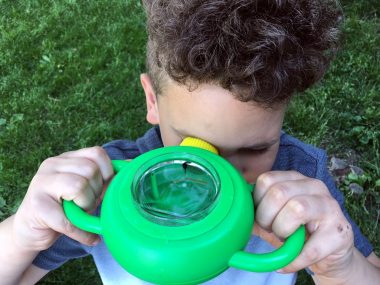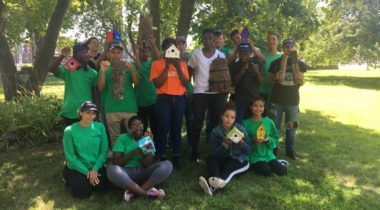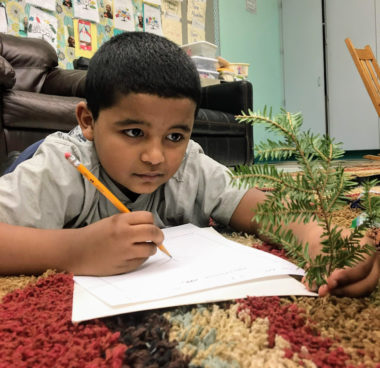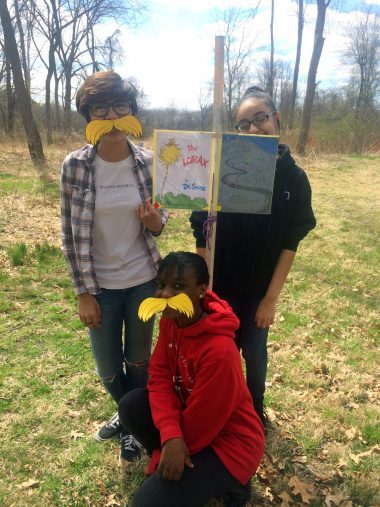Gallery
Freshman Academy Compass: Environmental Adventures (9th grade)
This program for ninth graders focuses on the environmental impact of humans on our planet as well as protecting local habitats.
Hands-on activities lead to discussions about water quality, how the warming ocean affects the weather, the benefits that trees provide, and so much more.
For example, students participate in the “Get Outside Challenge.” Whenever possible, students visit an open space near them and document the place by journaling, taking photographs, or even painting. Some discover that their favorite park happens to be LP&CT conservation land!
Compass students also typically attend the Youth Leaders for Climate Justice Summit, where they develop their own project to help mitigate the effects of climate change. Toward the end of each year, they help plan the annual spring Environmental Youth Conference, co-hosted with the Lowell High School T.R.E.E.S. (see below). This conference attracts other after-school programs from throughout the Merrimack River Watershed.
T.R.E.E.S at Lowell High School (10th-11th grade)
TREES, Teens Representing Environmental Excellency and Stewardship focuses on student-led impactful stewardship projects. These high school upperclassmen have participated in several Youth Leaders for Climate Justice Summits, with a focus on taking action and becoming stewards for the environment.
Typical sessions include meeting with professionals to learn more about careers in environmental fields such as urban forestry and climate advocacy. A favorite project is researching a tree species to help plant in Lowell in partnership with the Greening the Gateway Cities program.
TREES students also typically attend the Youth Leaders for Climate Justice Summit, where they develop their own project to help mitigate the effects of climate change. Each spring TREES students take on leadership roles in planning the annual spring Environmental Youth Conference, co-hosted with the Lowell High School Compass Program (see above). This conference attracts other after-school programs from throughout the Merrimack River Watershed.
Check out the Instagram account @lowellEYTF, which TREES and the Environmental Youth Task Force work together on producing.
McAvinnue (1st-4th grade)
Students at the McAvinnue are curious and enjoy exploring Lowell’s open spaces with a bird’s eye view, thanks to Google Earth; making connections to where they live and where the school is located relative to parks, rivers, and conservation land. Students get excited to realize that Hawk Valley Farm is practically their backyard!
These explorers experience bi-weekly visits from local wildlife thanks to Mass Audubon, including close-up views of a barred owl, striped skunk, American robin, and aquatic insects, such as dragonfly nymphs.
A favorite activity is to meet the eight Blanding’s turtle hatchlings that we head-start in our office (September-June) thanks to video conferencing and the live webcam!
McAuliffe (3rd-4th grade)
McAuliffe students explore nature through their hand-held guides and binoculars. They explore the outdoors by observing seasonal changes, local wildlife, and plant adaptations.
Thanks to Lowell National Historical Park, students also receive backyard exploration kits to learn about the bugs that live in their backyards.
Sullivan (5th-8th grade)
Sullivan students focus on the changing seasons, taking walks around the school property looking for signs of spring, fall, or winter. In the spring, they experience tapping a maple tree and collect data about what they notice (colors, trees blooming, and wildife). These data about phenological changes contributes to the Budburst project.
To further their background and sense of place and purpose in their city of Lowell, students experience a unit on fiber from both animals (sheep/silkworms) and plants (cotton/flax). Students are given a sample of wool and wool yarn to weave into a little piece of cloth on a cardboard loom.
These middle school students also experience bi-weekly visits from local wildlife, including close-up views of a snapping turtle, kestrel, striped skunk, and the ever-so-interesting hissing cockroach.
Shaughnessy (1st-4th grade)
The Shaughnessy school is close to one of Lowell’s two ponds, which is a short walk away. They also have a schoolyard rich with trees that can be explored. If you stop by the main office, you can ask for a tree guide that students created of the school grounds.
Lincoln (K-4th grade)
Lincoln students are taking it all in through their senses. They love playing fun listening games, hearing different owl calls and forest noises, and guessing what animals made them.
Bi-weekly visits from animals is a highlight of this program thanks to our partnership with Mass Audubon. A favorite of these nature-explorers is visiting with the baby mice and little screech owl. The baby mice make a great addition to the ‘whose baby is this?’ game they like to play.
Morey (1st-2nd grade)
Morey students love sharing nature moments they experience during the week. Their favorite activities include matching games: matching animals to the correct ecosystem and matching tracks to the correct animal.
They especially love drawing their animal visitors. Some of their favorite animal visitors included the barred owl and red-tailed hawk.
Butler Middle School (5th-8th grade)
These middle schoolers are keen explorers that observe and discover nature around them. Their outdoor explorations also included a walk around the Lowell Cemetery to observe the landscape and wildlife habitats.
These students are always surprised to learn that the Concord River flows right behind the school before it meets the nearby Merrimack River.
Bartlett (1st-2nd grade)
First and second grade students at Bartlett Community Partnership School host a school-year long investigation of seasonal changes in their courtyard garden, including a weekly study of decomposing pumpkins along with a temperature check that is recorded and plotted on a graph. They also meet a local animal on a bi-weekly basis to learn how animals adapt to the changing seasons.
Another favorite activity is collecting fallen leaves and seeds in their courtyard, determining why these fall off trees, then making “leaf creature” collages with those collected leaves and seeds. Recent works of art have included a “leaf man”, a dragon, and a bird, among many other creative designs.
Murkland (1st-2nd grade)
Murkland students are tree-mendously curious about all things trees! These student-scientists examine each part of their school yard trees, learn about how they help people every day, and how we can help them. By examining fallen leaves, tree width and height, and learning how to identify trees nearby, these students become tree experts in no time.
Students even make art with the help from trees, creating leaf people, animals, and pictures by using fallen leaves they collect.
Summer Programming (all sites)
July is busy with a condensed summer programming schedule that several hundred students participate in each year at all of our partner schools. The summer program activities range from nature scavenger hunts around the schoolyard, studying the butterfly life cycle, visiting with live hawks, owls, and mice, to planting a new pollinator garden at Jollene Dubner Park.
Spindle City Corps. (teens)
Spindle City Corps. teens dedicate their summer helping their community become healthier and more vibrant. For one week, they get to conduct a youth-led stewardship project on an LP&CT property. Some of their summer projects to date include: removing invasive species from Hawk Valley Farm, preserving a stone wall and foundation dating back to the 1600s; creating bird, bat, and bee houses to hang in Lowell’s open spaces; and creating a brochure with photographs and descriptions about the pollinator plant species found along the Concord River Greenway.
Spindle City Corps is an award-winning program run through the Lowell National Historical Park and Community Teamwork, Inc. in which young people complete service projects throughout the city. The Lowell Parks & Conservation Trust, in partnership with Mass Audubon Drumlin Farm Wildlife Sanctuary, has the wonderful opportunity to work with a portion of this group every summer on an environmental project designed by the students. Thank you, Spindle City Corps!
Our Sites
Lowell Leaders in Stewardship is implemented at several sites in Lowell, Massachusetts throughout the school year and summer. Sites (current and past) include:
-
Lowell High School-Freshman Academy/Compass Program (school year and summer programs)
-
Lowell High School – TREES, Teens Representing Environmental Excellence & Stewardship (10th-12th grade)
-
Spindle City Corps – Community Teamwork Inc. and Lowell National Historical Park (summer program)
-
McAuliffe Elementary School
-
McAvinnue Elementary School
-
Shaughnessy Elementary School
-
Greenhalge Elementary School
-
Robinson Middle School
-
Bartlett Community Partnership School – UMass Lowell Graduate School
-
Stoklosa Middle School and Wang Middle School
-
Girls Incorporated of Greater Lowell
-
Light of Cambodian Children Inc.
-
United Teen Equality Center (UTEC)
-
River Ambassadors – Lowell Telecommunications
-
Lowell High School – Environmental Science Club
-
Daley Middle School – Community Science Investigations
Sample Lesson Plans
Lesson Plan- Exploring with The Lorax
-
A free family program offered as a part of Lowell National Historical Park’s “April PLAYcation” week.
Lesson Plan – Gardening for a Healthier Planet
-
Developed from a workshop on integrating climate change into the classroom.
-
Supplemental materials : Pollinator Chart
-
Lesson Plan – The Role of Soil in the Fight Against Climate Change
-
Developed from a workshop on integrating climate change into the classroom.
